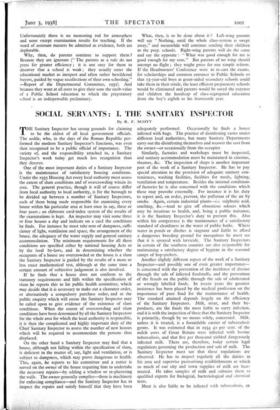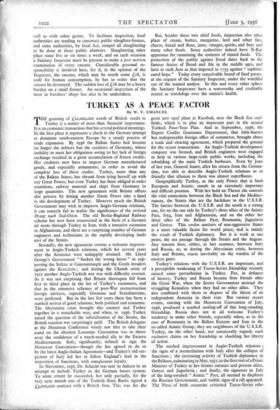SOCIAL SERVANTS : I. THE SANITARY INSPECTOR
By R. F. SCOTT
THE Sanitary Inspector has strong grounds for claiming to be the oldest of all local government officials. The aedile, who, in the days of the Roman Republic per- formed the modern Sanitary Inspector's functions, was even then recognised to be a public official of importance. The variety of, and the responsibility attached to, a Sanitary Inspector's work today get much less recognition than they deserve.
One of the most important duties of a Sanitary Inspector is the maintenance of satisfactory housing conditions. Under the 1935 Housing Act every local authority must assess the extent of slum conditions and of overcrowding within its area. The general practice, though it will of course differ from local authority to local authority, is for the borough to be divided up between a number of Sanitary Inspectors, each of them being made responsible for examining every house within his particular area at least once in say, three or four years ; an elaborate card-index system of the results of the examinations is kept. An inspector may visit some three or four houses a day and indicate on a card the conditions he finds. For instance he must take note of dampness, suffi- ciency of light, ventilation and space, the arrangement of the house, the adequacy of the water supply and general sanitary accommodation. The minimum requirements for all these conditions are specified either by national housing Acts or by the local by-laws, and in determining whether the occupants of a house are overcrowded or the house is a slum the Sanitary Inspector is guided by the results of a more or less exact mathematical test, although at the same time a certain amount of subjective judgement is also involved.
If he finds that a house does not conform to the statutory requirements and falls within the specification of slum he reports this to his public health committee, which may decide that it is necessary to make out a clearance order, or alternatively a compulsory purchase order, and at the public enquiry which will ensue the Sanitary Inspector may be called upon to give evidence of the existence of slum conditions. When the extent of overcrowding and slum conditions have been determined by all the Sanitary Inspectors for the whole area for which the local authority is responsible, it is then the complicated and highly important duty of the Chief Sanitary Inspector to assess the number of new houses which will be required to accommodate the persons thus displaced.
On the other hand a Sanitary Inspector may find that a house, although not falling within the specification of slum, is deficient in the matter of, say, light and ventilation, or is subject to dampness, which may prove dangerous to health. This, again, he reports to his committee and a notice is served on the owner of the house requiring him to undertake the necessary repairs—by adding a window or re-plastering the walls. The owner generally complies—there is machinery for enforcing compliance—and the Sanitary Inspector has to inspect the repairs and satisfy himself that they have been adequately performed. Occasionally he finds a house infested with bugs. The practice of disinfesting varies under different local authorities, but many Sanitary Departments carry out the disinfesting themselves and recover the cost from the owner—or occasionally from the occupier.
Similarly, factories and workshops must be inspected, and sanitary accommodation must be maintained in cinemas, theatres, &c. The inspection of shops is another important part of the work of a Sanitary Inspector. He has to pay special attention to the provision of adequate sanitary con- veniences, washing facilities, facilities for meals, lighting, ventilation and temperature. Besides the internal conditions of factories he is also concerned with the conditions which these may provoke externally. For instance it is his duty to report and, on order, prevent, the pollution of the air by smoke. Again, certain industrial plants—i.e. sulphuric acid, smelting, &c.—tend to give off obnoxious odours which may be injurious to health, and, being a public nuisance, it is the Sanitary Inspector's duty to prevent this. Also within his competence is the maintenance of a satisfactory standard of cleanliness in the water of public baths. Where water in ponds or ditches is stagnant and liable to afford a dangerous breeding ground for mosquitoes he must see that it is sprayed with larvicide. The Sanitary Inspectors in certain of the southern counties are also responsible for maintaining a satisfactory degree of hygiene in the seasonal camps of hop-pickers.
Another slightly different aspect of the work of a Sanitary Inspector—and possibly one of even greater importance— is concerned with the prevention of the incidence of disease through the sale of infected foodstuffs, and the prevention of the frauds on the public through the sale of adulterated or wrongly labelled foods. In recent years the greatest insistence has been placed by the medical profession on the importance of pure food for the maintenance of health. The standard attained depends largely on the efficiency of the Sanitary Inspectors. Milk, meat, and their by- products, are the foods the most liable to carry infection, and it is with the inspection of these that the Sanitary Inspector is primarily, though by no means solely, concerned. Milk, unless it is treated, is a formidable carrier of tuberculosis germs. It was estimated that in 1934 40 per cent. of the milch cows of Great Britain were infected with bovine tuberculosis, and that five per thousand yielded dangerously infected milk. There are, therefore, today certain legal regulations governing the production and sale of milk. The Sanitary Inspector must see that these regulations are observed. He has to inspect regularly all the dairies in his area and supervise pasteurising establishments at which so much of our city and town supplies of milk are heat- treated. He takes samples of milk and submits them to qualified experts for biological, bacteriological and chemical tests.
Meat is also liable to be infected with tuberculosis, as well as with other germs. To facilitate inspection, local authorities are tending to construct public -slaughter-houses, and some authorities, by local Act, compel all slaughtering to be done at these public abattoirs. Slaughtering takes place some five or six times a week, and on each occasion a Sanitary Inspector must be present to make a post mortem examination of every carcase. Considerable personal re- sponsibility is involved here, for if, in the opinion of the Inspector, the carcase, which may be worth some £18, is unfit for human consumption, he has to order that the carcase be destroyed. The sudden loss of £18 may be a heavy burden on a small 'farmer. An occasional inspection of the meat in butchers' shops has also to be undertaken. But, besides these two chief foods, inspection also takes place of cream, butter, margarine, lard and other fats, cheese, bread and flour, jams, vinegar, spirits, and beer and many other foods. Some authorities indeed have X-Ray apparatus for examining the contents of tinned foods. The protection of the public against fraud dates back to the famous Assize of Bread and Ale in the middle ages, and later to such Acts as that imposed in 1733 against " sophisti- cated hops." Today every conceivable brand of food passes, at the request of the Sanitary Inspector, under the watchful eye of the trained analyst In -this and every other sphere the Sanitary Inspectors have a noteworthy and creditable record as watchdogs over the nation's health.



















































 Previous page
Previous page